SmartQCache: Fast and Precise Pulse Control With Near-Quantum Cache Design on FPGA
IF 2.7
3区 计算机科学
Q2 COMPUTER SCIENCE, HARDWARE & ARCHITECTURE
IEEE Transactions on Computer-Aided Design of Integrated Circuits and Systems
Pub Date : 2024-11-13
DOI:10.1109/TCAD.2024.3497839
引用次数: 0
Abstract
Quantum pulse serves as the machine language of superconducting quantum devices, which needs to be synthesized and calibrated for precise control of quantum operations. However, existing pulse control systems suffer from the dilemma between long synthesis latency and inaccuracy of quantum control systems. compute-in-CPU synthesis frameworks, like IBM Qiskit Pulse, involve massive redundant computation during pulse calculation, suffering from a high computational cost when handling large-scale circuits. On the other hand, field-programmable gate array (FPGA)-based synthesis frameworks, like QuMA, faces inaccurate pulse control problem. In this article, we propose both compute-in-CPU and all-in-FPGA solutions to collaboratively solve the latency and inaccuracy problem. First, we propose QPulseLib, a novel compute-in-CPU library with reusable pulses that can directly provide the pulse of a circuit pattern. To establish this library, we transform the circuit and apply convolutional operators to extract reusable patterns and precalculate their resultant pulses. Then, we develop a matching algorithm to identify such patterns shared by the target circuit. Experiments show that QPulseLib achieves基于FPGA的近量子缓存设计的快速精确脉冲控制
量子脉冲是超导量子器件的机器语言,需要对量子脉冲进行合成和校准,以实现对量子运算的精确控制。然而,现有的脉冲控制系统面临着量子控制系统合成延迟长和精度不高的困境。cpu内计算合成框架,如IBM Qiskit Pulse,在脉冲计算过程中涉及大量冗余计算,在处理大规模电路时计算成本高。另一方面,基于现场可编程门阵列(FPGA)的综合框架,如QuMA,面临脉冲控制不准确的问题。在本文中,我们提出了cpu计算和fpga集成的解决方案,以协同解决延迟和不准确问题。首先,我们提出了QPulseLib,这是一个新颖的cpu内计算库,具有可重用的脉冲,可以直接提供电路模式的脉冲。为了建立这个库,我们对电路进行了变换,并应用卷积算子提取可重用模式并预先计算其产生的脉冲。然后,我们开发了一种匹配算法来识别目标电路共享的这些模式。实验表明,与Qiskit pulse和AccQOC相比,QPulseLib实现了158.46倍和16.03倍的脉冲计算加速。此外,我们使用近量子缓存设计SmartQCache将设计扩展为快速精确的全fpga脉冲控制方法。具体地说,我们使用了一个两级缓存来保存经常使用的电路模式的可重用脉冲。这样的设计可以在近量子外设中进行脉冲预取,从而大大减少端到端合成延迟。为了实现精确的脉冲控制,SmartQCache结合了持续时间优化和脉冲序列校准,以减轻不完美的硬件,串扰和时移造成的执行错误。实验结果表明,与Qiskit pulse和AccQOC相比,SmartQCache在脉冲合成方面实现了294.37倍和145.43倍的加速。与QuMA相比,它还将脉冲不准确性降低了1.27倍。
本文章由计算机程序翻译,如有差异,请以英文原文为准。
求助全文
约1分钟内获得全文
求助全文
来源期刊
CiteScore
5.60
自引率
13.80%
发文量
500
审稿时长
7 months
期刊介绍:
The purpose of this Transactions is to publish papers of interest to individuals in the area of computer-aided design of integrated circuits and systems composed of analog, digital, mixed-signal, optical, or microwave components. The aids include methods, models, algorithms, and man-machine interfaces for system-level, physical and logical design including: planning, synthesis, partitioning, modeling, simulation, layout, verification, testing, hardware-software co-design and documentation of integrated circuit and system designs of all complexities. Design tools and techniques for evaluating and designing integrated circuits and systems for metrics such as performance, power, reliability, testability, and security are a focus.

 求助内容:
求助内容: 应助结果提醒方式:
应助结果提醒方式:


